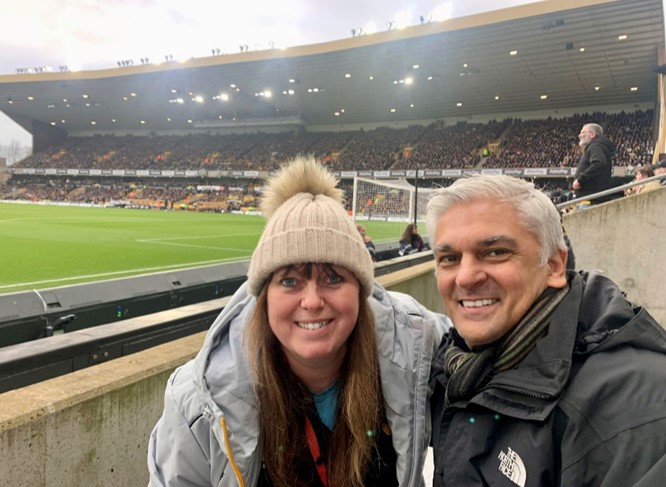Sports fans in the Midlands who are living with dementia will benefit from a new landmark guide from Alzheimer’s Society.
Alzheimer’s Society’s Dementia Friendly Sports Clubs and Venues guide was created by Alzheimer’s Society’s Sport United Against Dementia Board, which funded a dedicated role at the start of last year, including contributions from the Premier League and other sporting stakeholders.
The charity has engaged directly with clubs from multiple sports, professional bodies and people affected by dementia, with the aim of sharing best practice and identifying key challenges and positive solutions. Giving supporters living with dementia a smooth journey from sofa to stands, the guidance is designed for venues of all sizes to ensure fans with dementia are supported, understood and know where to get help on gamedays.
The charity collaborated with clubs that have already implemented dementia-friendly procedures such as Swansea, Wolverhampton Wanderers, Brighton and Hove Albion, Everton, Manchester City and Surrey County Cricket Club. There are 900,000 people with dementia across the UK, enough to fill Molineux Stadium 30 times.
Disability Officer at Wolves, Laura Wright explained: “Two years ago a fan with young-onset dementia got in touch after the pandemic, as he was nervous about going back to Molineux and would need help finding his seat. That is when we began working with Alzheimer’s Society to make a dementia care pack for fans, to ensure their matchday experience became smoother and less stressful.
“We take a supporter centered approach. A fan in the early stages of their dementia journey may want to stay in their seat, those with more advance symptoms might prefer the sensory room, while some might benefit from using a wheelchair space even if they can walk, because they need a little extra space around them. I also put stickers on the seats for fans with dementia to act as a reminder where to sit.
“We have already helped 23 Wolves supporters with dementia make their matchday experience better so they can continue enjoying live games. But from our season ticket holders and members, based on the fact that 1 in 14 people over 65 are impacted, we would have 305 attend Molineux with dementia.
“So we know there are more fans that could benefit from our support and we want to reach them. In February, a fan with dementia, Tim, attended his first match in years and came back again the following weekend because of the support we gave. All of our megastore staff, stadium tour guides and frontline workers have received Dementia Friends training so know the signs to look out for and how to best support fans with the disease.”
Judith King Alzheimer’s Society - Head of local Services in the Midlands said: “Sport should be unforgettable and have no boundaries. It can provide a universal language for young and old alike. The colours, laughter, camaraderie and the emotion, form a relationship with sport can last a lifetime. Providing an inclusive and accessible environment for people with dementia is not just about practical changes. It is creating a culture, both in and outside the organisation.
“Sports clubs help people affected by dementia retain their sense of purpose, dignity and allow them to maintain a good quality of life. Small changes such as increased signage, offering quiet spaces, changes to ticket policies, seat allocation near accessible facilities and staff training can result in significantly better experiences for spectators.”
A veteran season ticket holder with dementia might feel like they are attending for the first time, every time they visit. That shows why clear and bold signage can help them to better understand and navigate their surroundings.
With short-term memory often impacted matchday difficulties can include losing tickets, forgetting where their seat is, navigating their way to the ground via public transport and turning up at the wrong time. Feelings of confusion and disorientation are common, while many with dementia report feeling frustrated asking for food at kiosks as they struggle finding the right words.
Symptoms for people with early-onset dementia can appear as drunkenness, leading to problems in stadiums when stewards misread a situation. For other spectators with dementia, complications begin before match day as they insist using technology is challenging and club websites can be alienating.
Judith continues: “People with dementia are often forced to give up the things they have always enjoyed, such as watching live sport because of inaccessible environments. Sport plays an important role in keeping people connected within their communities, creating new memories or revisiting old ones.”
The FA has extended its official charity partnership with Alzheimer’s Society across the UK, until July 2024. The partnership has already made a tangible impact - over the past two seasons, the partnership has raised over £400,000, with thousands more fans, players and staff now knowing where to go to access vital dementia support.











